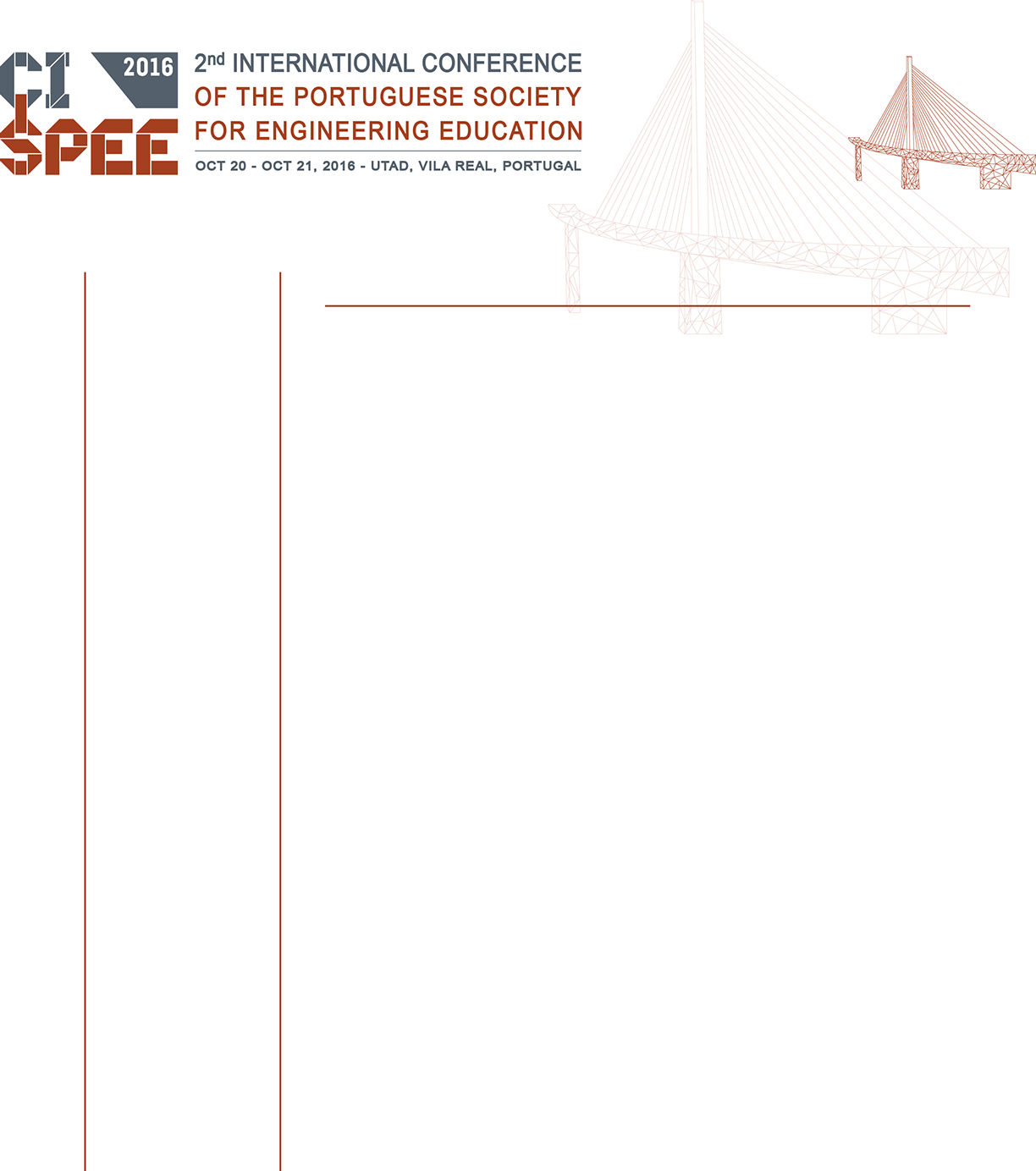
SPONSORS
SPONSORS
SUPPORTED BY
SUPPORTED BY











WORKSHOP
WORKSHOP
WORKSHOP: Part II
October 19th, 2016, 16:15 to 17:45
PUBLISHING IN AN ENGINEERING EDUCATION RESEARCH JOURNAL
Authors: Bill Williams and Pedro Neto
Program:
Engineering education research (EER) is a broad-based, rapidly evolving, diverse, interdisciplinary, and international field in which scholars apply the methods of educational research to address a variety of issues pertaining to teaching and learning in engineering. Engineering faculty who are accustomed to publishing their research in specialist engineering journals may encounter initial challenges in selecting a journal in which to publish their education research.
The workshop will guide participants in selecting an EER journal in which to publish and will also look at the preparation of their work for submission. In addition it will offer hands-on practice in assigning keywords to research using the Taxonomy adopted by a number of journals as part of their submission process. Using standard terminology for the keywords included in their publications can help researchers with similar interests find and cite their work.
Ludwig Krippahl is an assistant professor at the Computer Science Department of Faculdade de Ciências e Tecnologia da Universidade Nova de Lisboa since 2005. He has a MsC degree in artificial intelligence, a PhD in structural biochemistry and his main research interests are in bioinformatics and artificial intelligence. From 2006 through 2011 he taught a Critical Thinking course to computer science students, with a focus on aspects of critical thinking relevant to engineering students, such as scientific reasoning and decision, in addition to the classical subjects of logic and argumentation.
WORKSHOP: Part I
October 19th, 2016, 14:00 to 16:00
HOW TO IMPLEMENT CRITICAL THINKING IN MY ENGINEERING DEGREE?
Authors: webPACT and Ludwig Krippahl
Program:
This workshop will focus on critical thinking in the context of scientific and engineering reasoning and the particular challenges of teaching critical thinking to engineering students.
In the first part, the program will cover classical critical thinking topics, such as the notion of critical thinking as both an act and a disposition for reflexivity, the expression of reasoning in the form of arguments, informal logic and fallacies. Then it will expand from this traditional core into topics less often covered in philosophical approaches to critical thinking but more relevant for science and engineering: scientific reasoning, the conceptual structure of scientific problems, the evaluation of statistical and causal models, and inference to the best explanation and the problems of making decisions. The goal will be to provide a framework for understanding and teaching critical thinking that is better suited for science and engineering education than the traditional critical thinking approach, with its stronger emphasis on classical logic.
The second part of the workshop focuses on “questioning” as a strategy to develop critical thinking: types of questions, rules to take into account for a successful questioning process and questioning strategies (among these the reciprocal peer questioning).
The workshop will provide a space for sharing of experiences and debate, as well as hands-on activities.


Bill Williams originally trained as a chemist at the National University of Ireland and went on to work in education in Ireland, UK, Eritrea, Kenya, Mozambique and Portugal and to run international distance courses for the International Labour Organization in various African countries.
He holds a PhD in engineering management from IST, Lisbon and is a lecturer at the Barreiro Engineering School of Setubal Polytechnic Institute in Portugal. His research interests include engineering practice and the global evolution of engineering education research. He is lead editor of the edited volume Engineering Practice in a Global Context, Understanding the Technical and the Social published by Taylor and Francis in 2013 and is a member of the Review Committee of the Taxonomy of Engineering Education Research.
Bill Williams is chair of the Governing Board of the 500-member Research in Engineering Education Network (REEN), an associate editor of the European Journal of Engineering Education, member of the Board of the Working Group on Engineering Education Research of SEFI and is a founder member of the Portuguese Society for Engineering Education (SPEE).

Pedro Neto holds a PhD in civil engineering from IST, Lisbon and is a lecturer at the Barreiro Engineering School of Setubal Polytechnic Institute in Portugal. He has co-authored research on the international evolution of engineering education research.